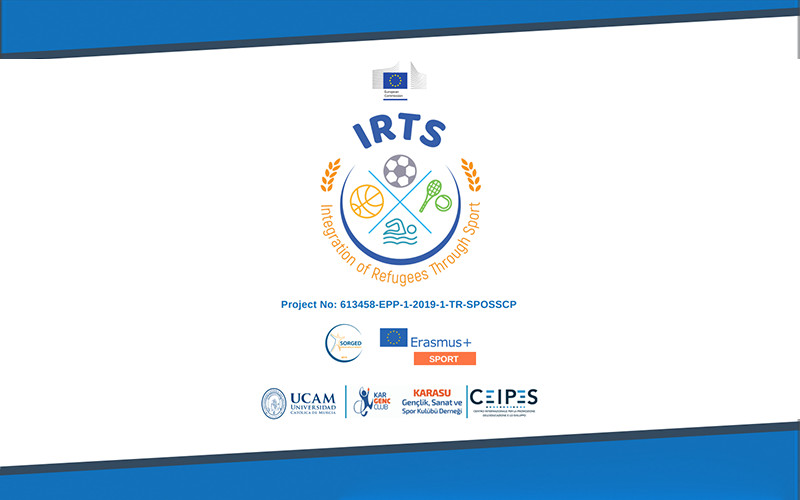The IRTS project – INTEGRATION OF REFUGEES THROUGH SPORT (funded by the Erasmus + Sport Programme – Programme for Small Collaborative Partnership; Project Number: 613458-EPP-1-2019-1-TR-SPO-SSCP) will end on December 31, 2020.
The partners who, along with the coordinator SORGED – SORGUN GENCLIK DERNEGI (TURKEY), worked on the project are: CEIPES – CENTRO INTERNAZIONALE PER LA PROMOZIONE DELL’EDUCAZIONE E DELLO SVILUPPO (ITALY), UCAM – FUNDACION UNIVERSITARIA SAN ANTONIO (SPAIN) and KARGENC CLUB – KARASU GENÇLIK, SANAT VE SPOR KULÜBU DERNEĞI (TURKEY).
The objectives of IRTS project were:
- Fostering social inclusion and equal opportunities for everyone through sport.
- Raising awareness on the importance of health-enhancing physical activities.
- To help in developing a European dimension of sport by making an important contribution to the integration of socially marginalized people, above all migrants, thus supporting strategies to tackle xenophobia and racism.
- Meeting the challenge of migrants’ social exclusion in Europe.
The activities carried out during the project’s eligibility period resulted in a report on migrants’ enhancement needs in sport and in a manual for the development of educational profiles.
At the link below, it is possible to download a booklet containing guidelines, developed as a result of the research activities carried out within the project, aimed at identifying the current entrepreneurial updating needs of migrants in the field of sport.
ENGLISH VERSION
In particular, the booklet aims at answering the following questions:
– What actions can be implemented in order to increase participation in sports activities by refugees?
– How does sport have a positive impact on the integration of refugees?
– What organisational changes can be made?
– How could trainers and refugees be motivated more effectively?
The booklet collects key lessons learnt, good practices and the identified critical issues, in order to provide useful suggestions on several aspects of the following topics: sport management and human resources management; coaching and mentoring; digital competences for sport managers; sport event management; marketing and communication in sport; financial sustainability strategies and mechanisms for sport organisations; good governance; the use of non-formal educational methods in sport for integration purposes for refugees.
At the following link, you will be able to access the analysis of the data that enabled the creation of this booklet
ENGLISH VERSION
By disseminating these guidelines, it will be possible, on one side, to share the already existing good practices and to transfer them to different contexts and sporting realities; on the other side, it will be possible to manage the highlighted critical aspects by making the necessary improvements.
